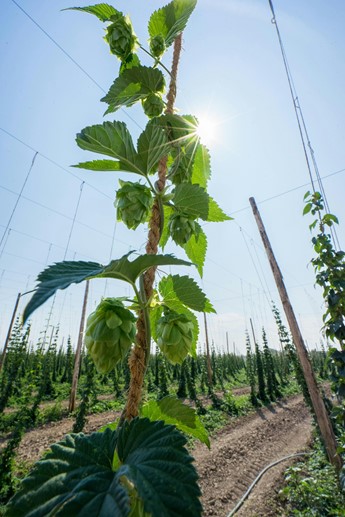Thirty to forty years ago a few English cask brewers, some monks in Belgium and some brewing upstarts in the USA were pretty much the only people using hops outside the brewhouse. Today more brewers probably dry hop than don’t. Dry hopping is the name we give to adding hops after wort cooling. As quite a lot goes on after wort cooling, this gives us brewers a wide array of options for finding the best approach.
Dry hopping can make a good beer into a fantastic beer. It can also make a good beer into a disaster! Done well, dry hopping can make beer a symphony of inviting fruity and floral notes, providing the kind of succulent mouthfeel that leads to a profound feeling of loss when your glass is empty. Done badly, it can turn vessels into volcanos and cans into hand grenades. It can also lead to a third of your beer ending up in the stomach of a cow, rather than the hand of a consumer.
The reason why dry hopping is called dry hopping remains a mystery. The hops that we add to a maturation vessel are no drier than those we add to the kettle. There are a few theories for how dry hopping got its name. One is that when the practice began, hops remained in the kettle for many brews to ensure that every last ounce (grams had not been invented at the time) of hop character was extracted. This meant that kettle hops were wet for most brews moving through the brewery. As the hops used later in the process were not reused, they were called dry hops. Another theory is that as sugar is removed in the fermentation process, the beer was no longer sweet but instead dry. This meant that the hops added to dry beer rather than sweet wort, were called dry hops. The last theory is that it is dry hopping because it makes beer taste drier. This is because dry hops provide polyphenols and can cause a secondary fermentation, both of which can lead to a drier tasting beer. A less common name for the process is cold hopping, which makes a lot more sense.

Until recently, dry hopping was almost the wild west of brewing, and scientific knowledge of dry hop flavour was scarce. However, as dry hopping has become more popular, scientific knowledge that can be used to optimise it, has blossomed. Our new Continuing Professional Development (CPD) course on dry hopping is a distillation of this science along with all the details of the latest technology. This is backed up by practical brewing knowledge gained from decades of experience with dry hopping. The course also features some interesting facts about hops and dry hopping, such as:
- Although they look and in some cases smell like them, hops are not flowers
- One brewery in the UK previously used the bags designed to hold underwear in washing machines, for dry hopping
- The aroma of hops is hundreds of times more complex than the most expensive designer perfume
- It might be only safe to drink one 330 ml can of some types of dry hopped beer per day
- One of the first references to hops being used to make beer was written by a German nun, Hildegaard von Bingen
- Some brewers use enzymes and genetically modified yeast to increase the amount of flavour derived from dry hopping
- Some brewers lose 30% of their beer when they dry hop
As with all our CPD courses, the IBD has not done this alone. We have called upon the knowledge of some of the world’s foremost dry hoppers! Brewers from these breweries have contributed tips for dry hopping to the course:
- Brasserie d’Orval
- Sierra Nevada Brewing Company
- Adnams Brewery
- Forest Road Brewing Company
- Thornbridge Brewery
Being the best brewer you can is only possible if you learn every day. Even if you are an experienced dry hopper, there is bound to be something in this course that will help you save money, improve quality and optimise the flavour of your dry hopped beer. If you have yet to dry hop, this course will show you the way. Either way, we are sure you will enjoy it.
Written by Stuart Howe, Technical Development Manager at the IBD.




